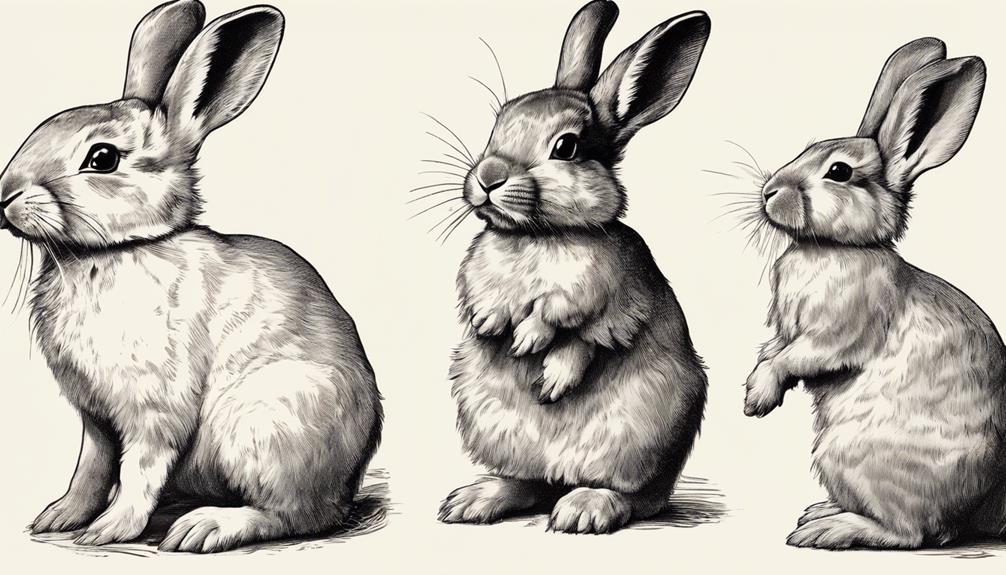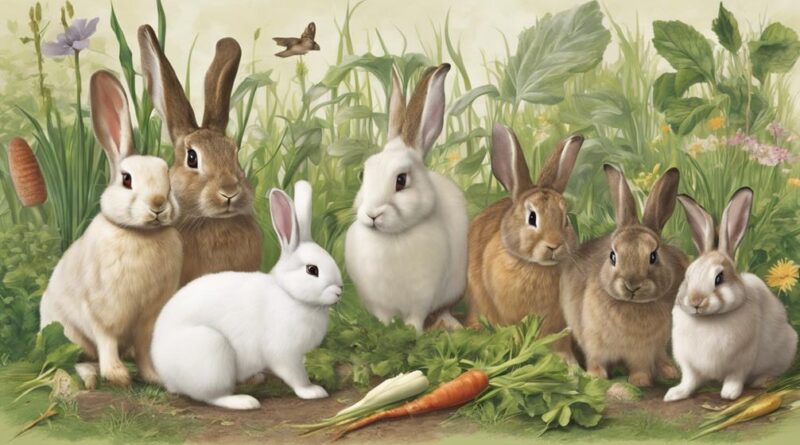What Determines the Lifespan of Rabbits?
Ever wondered why some rabbits seem to defy the age-old adage of 'multiply and conquer' while others hop off into the sunset prematurely?
The lifespan of these fluffy creatures is not just a matter of luck or random chance. Various factors intricately weave together to determine how long a rabbit will grace the meadows with its presence.
From the genes they inherit to the grass they nibble on, the secrets to rabbit longevity are as complex as they are intriguing.
Explore the rabbit hole of factors influencing their lifespan, and you might just uncover the key to unlocking the secrets of their longevity.
Factors Affecting Rabbit Lifespan
Factors such as genetics, diet, and living conditions significantly impact the lifespan of rabbits. However, two often underestimated elements that play a crucial role in determining how long your furry friend will live are exercise habits and social interactions.
Firstly, exercise habits are key in maintaining a rabbit's health and overall longevity. Just like humans, rabbits need regular physical activity to stay fit and healthy. Encouraging your rabbit to exercise by providing ample space to hop around, engaging in playtime, and offering toys for stimulation can all contribute to a longer lifespan. Exercise not only helps prevent obesity, which can lead to various health issues, but it also promotes cardiovascular health and muscle strength, essential for a rabbit's well-being.
Secondly, social interactions are vital for a rabbit's mental and emotional health, ultimately impacting its lifespan. Rabbits are social creatures that thrive on companionship. Whether it's bonding with other rabbits or forming strong bonds with their human caregivers, social interactions provide rabbits with mental stimulation and emotional support. A lack of socialization can lead to stress, depression, and even behavioral issues, all of which can negatively impact their lifespan.
Genetics and Hereditary Influences
Examining how genetics and hereditary factors influence the lifespan of rabbits reveals significant insights into their overall health and longevity. Genetic predispositions play a crucial role in determining how long a rabbit may live. Certain breeds have inherent traits that can affect their lifespan. For example, some breeds are genetically predisposed to certain health conditions that may shorten their longevity. Understanding these genetic factors can help rabbit owners make informed decisions regarding their care and potential health risks.
Hereditary factors also play a vital role in determining a rabbit's lifespan. The health history of a rabbit's ancestors can provide valuable information about potential health issues that may impact its longevity. By knowing the hereditary background of a rabbit, owners can take preventive measures to ensure their pet lives a longer and healthier life. Regular veterinary check-ups and screenings can help identify any hereditary conditions early on, allowing for prompt treatment and management.
Environmental Impact on Longevity
Understanding how a rabbit's living environment influences its longevity provides crucial insights into promoting their overall health and lifespan. The environmental factors surrounding rabbits play a significant role in determining how long they'll live. Here are some key elements that can impact a rabbit's lifespan:
- Climate Conditions: Harsh weather conditions can put stress on rabbits, affecting their health and longevity. Extreme temperatures or sudden weather changes can be detrimental to their well-being.
- Habitat Quality: A suitable habitat with adequate space, shelter, and access to fresh food and water is essential for rabbits to thrive and live longer lives.
- Predation Risks: The presence of predators can cause constant stress and fear in rabbits, leading to a shorter lifespan due to the constant threat to their safety.
- Human Interference: Human activities such as habitat destruction, pollution, and hunting can disrupt a rabbit's natural environment, impacting their longevity.
- Quality of Surroundings: A clean and safe environment free from harmful chemicals or objects that rabbits might ingest is crucial for their health and longevity.
Nutritional Requirements for Rabbit Health
To keep your rabbit healthy and thriving, it's essential to provide a well-balanced diet tailored to their specific nutritional requirements. Dietary balance plays a crucial role in maintaining your rabbit's digestive health. A diet rich in high-quality hay, fresh vegetables, and a limited amount of pellets is key to ensuring they receive the necessary nutrients for optimal well-being.
Ensuring your rabbit receives proper nutrition helps prevent vitamin deficiencies that can lead to serious health issues. Vitamins such as A, D, and E are vital for your rabbit's overall health and immune system function. Incorporating a variety of vegetables into their diet can help meet these essential vitamin needs.
Weight management is another critical aspect of your rabbit's nutritional requirements. Obesity in rabbits can lead to various health problems, such as joint issues and decreased lifespan. Monitoring their food intake and providing regular exercise opportunities, such as supervised playtime outside their enclosure, can help maintain a healthy weight.
Common Health Issues in Rabbits
When caring for rabbits, it's crucial to be aware of common health issues they may face. These small and delicate animals can be prone to various ailments that can impact their well-being. Here are some common health issues in rabbits to watch out for:
- Dental problems: Rabbit's teeth continuously grow, and without proper wear, they can develop dental issues leading to pain and difficulty eating.
- Digestive issues: Rabbits have sensitive digestive systems, prone to problems like gastrointestinal stasis, which can be life-threatening if not addressed promptly.
- Parasites: External parasites like mites or fleas, as well as internal parasites like worms, can affect your rabbit's health and wellbeing.
- Respiratory problems: Rabbits are susceptible to respiratory infections, especially when exposed to drafts, dust, or cigarette smoke, which can lead to serious complications if not treated promptly.
Keeping a close eye on your rabbit's behavior and habits can help you spot any signs of these health issues early on. Regular veterinary check-ups, a balanced diet, and a clean living environment can all contribute to keeping your rabbit healthy and happy.
Veterinary Care and Preventive Measures
Regular veterinary check-ups play a crucial role in maintaining the health and well-being of your rabbit. These check-ups allow veterinarians to assess your rabbit's overall health, provide necessary vaccinations, and detect any potential health issues early on.
Parasite prevention is key in keeping your rabbit healthy. Your vet can recommend appropriate parasite prevention methods to safeguard your rabbit from fleas, mites, and other harmful parasites.
Vaccinations are essential for protecting your rabbit against common diseases. Your veterinarian will advise you on the necessary vaccinations based on your rabbit's lifestyle and risk factors.
Dental care is another vital aspect of your rabbit's health. Regular dental check-ups can help prevent dental issues such as overgrown teeth, which can lead to eating difficulties and other health problems.
Grooming maintenance is crucial for keeping your rabbit's coat clean and free from mats. Regular grooming sessions not only help in maintaining your rabbit's hygiene but also provide an opportunity to check for any unusual lumps, bumps, or signs of skin issues.
Growth Stages of Rabbits

During the growth stages of rabbits, their development progresses rapidly, with distinct changes occurring over specific periods. Rabbits go through various growth stages that are crucial for their overall well-being and lifespan. Understanding these stages can help you provide the best care for your furry companions.
- Reproductive Behavior: As rabbits mature, they exhibit distinct reproductive behaviors. Understanding these behaviors can help you manage their breeding habits and prevent unwanted litters.
- Age-Related Changes: Just like any living being, rabbits undergo age-related changes as they grow older. Being aware of these changes can help you detect any signs of aging or health issues early on.
- Nutritional Needs: Meeting the nutritional requirements of rabbits during their growth stages is vital for their development. Providing a balanced diet can ensure they grow healthy and strong.
- Socialization: Socialization plays a significant role in the growth stages of rabbits. Ensuring they've proper social interactions can contribute to their mental well-being and overall happiness.
- Exercise Requirements: Encouraging physical activity is crucial for the growth stages of rabbits. Providing them with enough space to exercise and play can promote their physical health and prevent obesity.
Enhancing Rabbit Well-being and Longevity
To improve the well-being and lifespan of your rabbits, prioritize their mental and physical health through enriched environments and regular veterinary care.
Mental stimulation is crucial for keeping your rabbits active and engaged. Provide toys like tunnels, balls, and puzzle feeders to encourage play and exploration. Rotating these toys regularly can prevent boredom and stimulate their minds. Additionally, consider creating obstacle courses or hiding treats around their enclosure to promote mental agility and problem-solving skills.
Exercise is equally important for your rabbits' well-being. Allow them space to hop, run, and explore. Outdoor playpens or supervised time in a rabbit-proofed room can provide the necessary physical activity to keep them healthy. Regular exercise not only maintains their physical health but also prevents obesity and related health issues.
Socialization and companionship are vital aspects of rabbit care. Rabbits are social animals and thrive in the company of their kind. If possible, consider keeping rabbits in pairs to prevent loneliness and provide emotional support. Introducing new toys, tunnels, or even rotating their living arrangements can also prevent monotony and enrich their social interactions.
Frequently Asked Questions
Can Rabbits Live Longer if They Are Kept as Indoor Pets?
Living indoors provides rabbits with a safer environment, reducing risks of predators and extreme weather. Indoor pets often receive better care and attention, leading to improved health benefits. This can positively impact their longevity compared to outdoor rabbits.
Are There Any Specific Supplements That Can Help Increase a Rabbit's Lifespan?
If you're looking to boost your rabbit's lifespan, supplements can make a difference. Certain supplements can provide essential nutrients that may not be fully met through their regular diet.
Make sure to consult with a vet to determine the best supplements for your rabbit's specific dietary requirements. Adding these supplements to their diet can contribute to their overall health and potentially increase their lifespan.
Do Certain Rabbit Breeds Tend to Live Longer Than Others?
Certain rabbit breeds may indeed have genetic predispositions that can influence their lifespan. Factors like size, breeding practices, and overall health can play a role.
Additionally, the environment in which a rabbit lives, along with diet and healthcare, can also impact longevity. Providing a balanced diet, regular veterinary check-ups, and a safe, stress-free living space can all contribute to helping your rabbit live a longer and healthier life.
How Can Exercise Impact a Rabbit's Overall Lifespan?
Regular exercise is crucial for your rabbit's health. It helps maintain a healthy weight, strengthens muscles, and promotes overall well-being.
By providing opportunities for physical activity, you can help extend your rabbit's lifespan.
Combining exercise with a balanced diet, mental stimulation, regular vet check-ups, and social interaction creates a holistic approach to caring for your rabbit and ensuring a longer, happier life.
Are There Any Natural Remedies or Alternative Therapies That Can Help Extend a Rabbit's Lifespan?
If you're looking to extend your rabbit's lifespan, consider trying herbal remedies and holistic treatments. Making dietary changes and adjusting environmental factors can also have a positive impact.
Creating a balanced and natural lifestyle for your bunny can contribute to their overall well-being and longevity. Remember, small changes can make a big difference in your furry friend's health and happiness.
Conclusion
In conclusion, the lifespan of rabbits is determined by a combination of genetics, environment, nutrition, and healthcare. By understanding and addressing these factors, you can help ensure that your rabbit lives a long and healthy life.
Regular veterinary check-ups, proper diet, and a safe living environment are essential for promoting the well-being and longevity of your furry companion. Remember to provide love and care to your rabbit to help them thrive for years to come.
